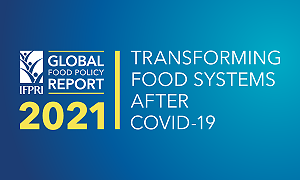Agrifood value chains in the world’s low- and middle-income countries (LMICs) have expanded rapidly over the past decade, supplying an increasing volume and diversity of food products.
Search
The second annual Global Food 50/50 Report, a joint initiative of Global Health 50/50, the International Food Policy Research Institute (IFPRI), and UN Women, reviews the gender- and equity-related policies and practices of 51 global food system o
Le changement climatique constitue une menace croissante pour nos systèmes alimentaires, dont les implications sont graves pour la sécurité alimentaire et nutritionnelle, les moyens de subsistance et le bien-être général, en particulier pour les p
Climate change threatens our food systems and the multiple development goals linked to sustainable food system transformation. Action is urgently needed, both to increase adaptation and resilience and to achieve major emissions reductions
Climate change is a growing threat to our food systems, with grim implications for food and nutrition security, livelihoods, and overall well-being, especially for poor and vulnerable people around the world.
Regional developments: Central Asia
Central Asia faced unprecedented challenges in 2020 as the global pandemic compounded existing problems facing the region.
Regional developments: Central Asia [in Russian}
В 2020 году страны Центральной Азии столкнулись с беспрецедентными вызовами, поскольку глобальная пандемия усугубила существующие в регионе проблемы.
Pre-pandemic, 3 billion people could not afford a healthy diet; that number could rise by 267.6 million due to the pandemic. Food system transformation must support healthy diets and tackle all forms of malnutrition.
2021 Global food policy report: Transforming food systems after COVID-19: Synopsis [in Chinese]
2020年在诸多方面都让我们始料未及。新冠肺炎(COVID-19)疫情为全球带来了一场大规模的公共卫生灾难,各国均陷入了疫情及其相关应对政策带来的不同程度的经济困境,面临服务严重中断和人员流动严重受限的局面。无论是富裕国家还是贫穷国家,均未能幸免。在中低收入国家,许多弱势群体直接面临食物安全、医疗和营养方面的威胁。丧失生计、营养不良、教育中断和资源枯竭造成的长期影响可能性非常巨大,特别是对许多国家来说,距离新冠肺炎疫情的结束还遥遥无期。
Private sector enterprises all along food supply chains must play a central role in food system resilience and transformation; the pandemic revealed some of the sector’s weaknesses and strengths that can help to build greater resilience.
The coronavirus pandemic has upended local, national, and global food systems, and put the Sustainable Development Goals further out of reach. But lessons from the world’s response can help address future shocks and contribute to change.
Food systems need to be transformed if we are to meet the Sustainable Development Goals and increase resilience of these systems to shocks. The pandemic has provided useful lessons on opportunities and weaknesses that must be addressed.
The coronavirus pandemic has upended local, national, and global food systems, and put the Sustainable Development Goals further out of reach. But lessons from the world’s response can help address future shocks and contribute to change.
Toward inclusive food systems: Pandemics, vulnerable groups, and the role of social protection
Vulnerable groups have been most affected by disruption to food systems, such as lockdowns, through loss of employment and incomes. Social protection has a key role to play in times of health and economic shocks.
Rethinking food system policies in terms of “eco-agro-food systems” can help to foster an integrated approach that will maintain and restore vital ecosystem services and reduce the likelihood of future shocks.
2021 Global food policy report: Transforming food systems after COVID-19: Synopsis [in Arabic]
Abstract Text Here
2021 Global food policy report: Transforming food systems after COVID-19: Synopsis [in Russian]
2020 год был во многом беспрецедентным.
L’année 2020 a été une période inédite à bien des égards.

